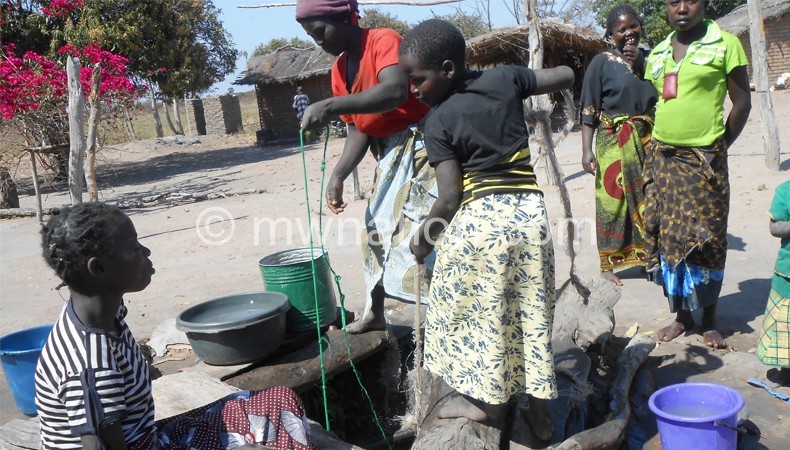Water crisis putting lives at risk

The saying goes water is life, but for most Malawians, it has taken on a different meaning because if it were life, they would be dead by now. That is because it has now become common for people in cities to go for days without a drop of water from their taps, while in rural areas, walking long distances in search of water is the order of the day.
For villagers of Traditional Authority (T/A) Mduwa in Mchinji, the story is not any different.
Since the early 1970’s, some villages in Mchinji have lived without clean water, let alone a safe water point. For people in those areas, sharing water with domestic animals is not unusual. The water is used for drinking, bathing, laundry and other household needs.
“If water is life, it is by God’s grace that we are alive. Our bodies have become immune to waterborne diseases because we use unclean water every day,” said 35-year-old Felesia Nelesoni of Gwena Village, T/A Mduwa in the district.
Nelesoni, like many other women from her village and surrounding areas, says this lack of safe and clean water affects their daily lives.
Gwena Village is 40 kilometres from the tarmac road to Kapiri Trading Centre in the district. It has over 1 000 people who share one shallow water source which is not protected.
The area is so dry that finding water on the ground is hard. At times, especially in the dry season, they stay for weeks without bathing and children miss school as they walk long distances in search of water.
“The water dries up fast as soon as the rainy season ends. We walk long distances to fetch the water. Washing clothes is like wasting water here. So in our small community, one person is allowed to wash per week, and it may take a month for one to get their turn,” says Nelesoni.
Jenipher Palison, a mother of seven from the village, says the well is not enough to cater for the whole village as the water dries up fast.
“We wake up as early as 3 o’clock in the morning to access water from this well, which dries up after about 12 full pails of water. Then we wait for more hours for it to refill,” Palisoni says.
She says they know the water is not safe, but most of them cannot afford Water Guard or chlorine to make it safe for drinking.
“So we just drink it like that. When we have enough firewood, we boil it but that is rare. We just keep our faith in God, believing that He alone protects us from this unsafe water,” she says.
In the dry season, they walk about two kilometres to a nearby swampy area to get water from the swamps which they share with animals.
“We have to tussle with the owner of the garden near the swamp, who does not want us to draw water from his field. He sometimes takes a bath in the pool and we have to wait for the bath water to subside before we draw water,” says Giliseria Gelevazio, another villager.
The village does not have a modern water source like water pumps or taps, and it seems completely cut off from any form of development.
This is why they are grateful to Assemblies of God Relief and Development Services (Agreds), a non-governmental organisation that has promised to drill a borehole in each of the nine villages of T/A Mduwa.
Mchinji Agreds projects officer Grace Ngwira said the nine villages they have targeted lack clean water sources and are isolated in developmental activities as they are far from the main roads and the boma.
“We noted that people in these villages have been denied their right to safe and clean water. As a result, cases of diarrhoea are common as the water they drink is not protected. We will drill boreholes in these areas so that people can have water all year through,” she said.
Apart from drilling the boreholes, Agreds is also promoting good sanitation practices among the villages by discouraging open defeacation so that the boreholes which will be drilled will be kept safe.
According to district water development officer for the area Mike Chilimmadzi, T/A Mduwa’s area has a coverage of 45 percent of access to safe water, which is the lowest in the district
“Currently, the district has a 65 percent coverage of access to safe water, but Mduwa has the lowest coverage at 45 percent. One of the reasons for this is that people in the area do not demand water development projects. Maybe they lack information on how to demand their right to water,” Chilimmadzi said.
T/A Mduwa has a population of 82 018 with only 148 boreholes and 23 non-functional communal taps, according to the district water department.
Millennium Development Goal number 7 states that accelerated and targeted efforts are needed to achieve the goal of halving the proportion of the population without sustainable access to safe drinking water and basic sanitation by 2015 and achieve full access by 2025.
This, however, seems to be a farfetched dream, if the situation in T/A Mduwa’s area is anything to go by.
—Enelles Nyale works for Malawi News Agency.





